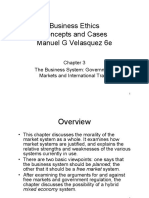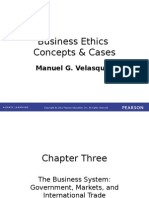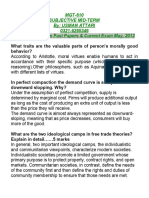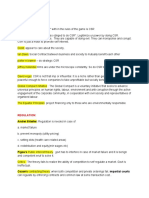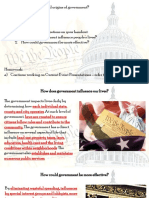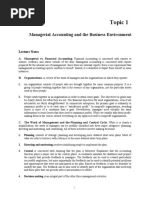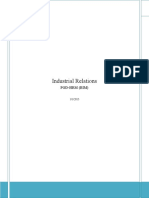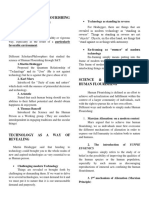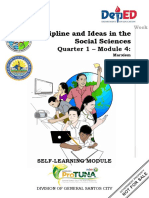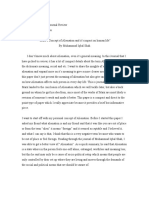0 ratings0% found this document useful (0 votes)
57 viewsBusiness Ethics - Chp3
Business Ethics - Chp3
Uploaded by
Sueraya ShahThis chapter examines the ethical aspects of different economic systems, including debates around free markets versus planned economies. It discusses two main viewpoints on how economic activities should be coordinated - individualistic societies promote free markets while communitarian societies use command systems. The chapter also analyzes arguments for and against free markets from thinkers like John Locke, Adam Smith, Karl Marx, and John Maynard Keynes. It addresses issues like private property rights, voluntary exchange, utility, government intervention, and free trade.
Copyright:
© All Rights Reserved
Available Formats
Download as PPTX, PDF, TXT or read online from Scribd
Business Ethics - Chp3
Business Ethics - Chp3
Uploaded by
Sueraya Shah0 ratings0% found this document useful (0 votes)
57 views33 pagesThis chapter examines the ethical aspects of different economic systems, including debates around free markets versus planned economies. It discusses two main viewpoints on how economic activities should be coordinated - individualistic societies promote free markets while communitarian societies use command systems. The chapter also analyzes arguments for and against free markets from thinkers like John Locke, Adam Smith, Karl Marx, and John Maynard Keynes. It addresses issues like private property rights, voluntary exchange, utility, government intervention, and free trade.
Original Description:
Based on Business Ethics: Concepts & Cases (7th edition)
Original Title
Business Ethics_Chp3
Copyright
© © All Rights Reserved
Available Formats
PPTX, PDF, TXT or read online from Scribd
Share this document
Did you find this document useful?
Is this content inappropriate?
This chapter examines the ethical aspects of different economic systems, including debates around free markets versus planned economies. It discusses two main viewpoints on how economic activities should be coordinated - individualistic societies promote free markets while communitarian societies use command systems. The chapter also analyzes arguments for and against free markets from thinkers like John Locke, Adam Smith, Karl Marx, and John Maynard Keynes. It addresses issues like private property rights, voluntary exchange, utility, government intervention, and free trade.
Copyright:
© All Rights Reserved
Available Formats
Download as PPTX, PDF, TXT or read online from Scribd
Download as pptx, pdf, or txt
0 ratings0% found this document useful (0 votes)
57 views33 pagesBusiness Ethics - Chp3
Business Ethics - Chp3
Uploaded by
Sueraya ShahThis chapter examines the ethical aspects of different economic systems, including debates around free markets versus planned economies. It discusses two main viewpoints on how economic activities should be coordinated - individualistic societies promote free markets while communitarian societies use command systems. The chapter also analyzes arguments for and against free markets from thinkers like John Locke, Adam Smith, Karl Marx, and John Maynard Keynes. It addresses issues like private property rights, voluntary exchange, utility, government intervention, and free trade.
Copyright:
© All Rights Reserved
Available Formats
Download as PPTX, PDF, TXT or read online from Scribd
Download as pptx, pdf, or txt
You are on page 1of 33
BUSINESS ETHICS
CONCEPTS & CASES
Manuel G. Velasquez
Chapter Three
The Business System:
Government, Markets, and
International Trade
OVERVIEW
• This chapter examines the ethical aspects of
the market system itself—how it is justified,
and what the strengths and weaknesses of
the system are from the point of view of
ethics.
• What is the difference between two
opposite ideologies, those who believe in
the "free market" and those who advocate a
"planned" economy".
• In general, two important ideological camps, the
individualistic and communitarian viewpoints,
characterize modern societies.
• Individualistic societies promote a limited
government whose primary purpose is to protect
property, contract rights, and open markets.
• Communitarian societies, in contrast, define the
needs of the community first and then define the
rights and duties of community membership to
ensure that those needs are met.
• These two camps face the problem of coordinating
the economic activities of their members in two
distinct ways.
• Communitarian systems use a command system, in
which a single authority decides what to produce,
who will produce it, and who will get it.
• Free market systems are characteristic of
individualistic societies.
• Incorporating ideas from thinkers like John Locke and
Adam Smith, they allow individual firms to make their
own decisions about what to produce and how to do
so.
• Free market systems have two main components:
a private property system and a voluntary
exchange system.
• The economic system is the system that a society
(or group of societies) uses to provide the goods
and services it needs to survive and flourish.
• To accomplish these two tasks, economic systems
rely on three kinds of social devices: traditions,
command and markets.
Economic Systems
• Tradition-Based Societies: rely on traditional
communal roles and customs to carry out
basic economic tasks.
• Command Economy: economic system based
primarily on a government authority making
the economic decisions.
• Market Economy: economic system based
primarily on private individuals making the
main economic decisions.
“Free” Markets and Trade
• Free Markets = each individual is able to
voluntarily exchange goods with others and to
decide what will be done with what he or she
owns without interference from government.
• Free Trade = citizens may freely trade goods
with the citizens of other nations without the
interference of tariffs, quotas, or other
government limits on the goods citizens may
buy from or sell to foreign citizens.
• Pure free market systems (that is “free” of government
“intrusion”) would have absolutely no constraints on the
property one can own and what one can do with it.
Slavery would be entirely legal, as would prostitution
and all drugs including hard drugs.
• Today, however, governments of even the most market-
oriented economies decree that there are some things
that may not be owned (such as slaves), some things that
may not be done with one’s own property (such as
pollution), some exchanges that are illegal (children’s
labor), and some exchanges that are imposed (through
taxation).
• Today debates continue on whether a nation’s
own internal economy should be organized on
“free trade” principles, and whether exchanges
between nations should be based on “free
trade” principles.
• Analyzing an ideology - a system of normative
beliefs shared by members of some social
group.
Debate over whether governments should intervene -- & to
what extent -- in the workings of the market system
Pro free-market arguments
John Locke: a free market best insures & protects
individual rights & freedom.
Adam Smith: free markets are the best way to provide
utilitarian benefits to society
• Anti free-market arguments
Karl Marx: capitalist systems promote injustice.
"Liberals": capitalist systems fail in various
ways to promote the general welfare & needs
to be supplemented by governmental (hence
command-based) programs.
Free Markets and Rights: John Locke
• John Locke (1632-1704), an English political philosopher, is
generally credited with developing the idea that human
beings have a "natural right" to liberty and a "natural
right“ to private property.
• Locke argued that if there were no governments, human
beings would find themselves in a state of nature.
• In this state of nature, each man would be the political
equal of all others and would be perfectly free of any
constraints other than the law of nature—that is, the
moral principles that God gave to humanity and that each
man can discover by the use of his own God-given reason.
• Thus, according to Locke, the law of nature
teaches us that we have a natural right to liberty.
• But because the state of nature is so dangerous,
says Locke, individuals organize themselves into
a political body to protect their lives and
property.
• The power of government is limited, however,
extending only far enough to protect these very
basic rights.
Locke’s State of Nature
• All persons are free and equal.
• Each person owns his body and labor, and
whatever he mixes his own labor into.
• People’s enjoyment of life, liberty, and property
are unsafe and insecure.
• People agree to form a government to protect
and preserve their right to life, liberty, and
property.
Criticisms of Locke’s View on Rights
• Locke does not demonstrate that individuals have
“natural” rights to life, liberty, and property.
• Locke’s natural rights are negative rights and he
does not show these override conflicting positive
rights.
• Locke’s rights imply that markets should be free,
but free markets can be unjust and can lead to
inequalities.
• Locke wrongly assumes human beings are
atomistic individuals.
Free Markets and Utility: Adam Smith
• Economic utility is maximized by the private property and
free market system.
• This system ensures that the economy produces what
consumers want since producers produce to meet consumer
demand produce it at the lowest possible prices since buyers
cause sellers to bid the prices down and with the greatest
efficiency since competition drives out the inefficient.
• The economic utility of society is well served by free markets
where agents are motivated only by self interest.
• Thus, private businesses are led to serve society "as if by an
invisible hand“.
Free Markets and Utility: Adam Smith
• Market competition (invisible hand) ensures the pursuit
of self-interest in markets and advances the public’s
welfare.
• Government interference in markets lowers the public’s
welfare by creating shortages or surpluses.
• Private ownership leads to better care and use of
resources than common ownership.
• Hayek and von Mises
• Governments should not interfere in markets because
they cannot have enough information to allocate
resources as efficiently as free markets.
Criticisms of Free Markets and Utility
• Rests on unrealistic assumption that there
are no monopoly companies.
• Falsely assumes that all costs of
manufacturing are paid by manufacturer,
which ignores the costs of pollution.
• Falsely assumes human beings are
motivated only by a self-interested desire
for profit.
Keynes’ Criticism of Smith
Government intervention was necessary because there is a mismatch
between aggregate supply and demand, which inevitably leads to a
contraction of supply.
Total (aggregate) demand is the sum of the demand from three
economic sectors – households, businesses & government.
Aggregate supply tends to outrun aggregate demand because
households prefer to save some of their income in liquid securities
(e.g., stocks & bonds) instead of spending it.
Oversupply leads to layoffs as producers cut production, resulting in a
vicious cycle
• overproduction
• recession & depression
• until eventually supply decreases to level of demand: less supply
due to diminished production
• savings will fall faster than incomes
Government Intervention
• Government, according to Keynes, can influence the propensity
to save, which lowers aggregate demand and creates
unemployment.
• First, government can prevent excess savings through its
influence on interest rates, and it can influence interest rates
by regulating the money supply.
• Second, government can directly affect the amount of money
households have available to them by raising or lowering taxes.
• Third, government spending can close any gap between
aggregate demand and aggregate supply by taking up the slack
in demand from households and businesses through
government expenditures.
Social Darwinism
• “Survival of the fittest”
• Belief that economic competition produces human
progress.
• Views of Herbert Spencer
• Evolution operates in society when economic
competition ensures the fittest survive and the unfit
do not, which improves the human race.
• If government intervenes in the economy to shield
people from competition, the unfit survive and the
human race declines, so government should not do
so.
• Assumes those who survive in business are “better”
people than those who do not.
Free Trade and Utility
• Advocated by Adam Smith.
• everyone prospers if nations specialize in making
and exporting goods whose production costs for
them are lower than for other nations.
• Advocated by David Ricardo.
• everyone prospers if nations specialize in making
and exporting goods whose opportunity costs to
them are lower than the opportunity costs other
nations incur to make the same goods.
• One country can produce a good more cheaply
than another and it is then said to have an
"absolute advantage" in producing that good.
These cost differences may be based on
differences in labor costs and skills, climate,
technology, equipment, land, or natural
resources.
• “comparative advantage” as a situation where
the opportunity costs (costs in terms of other
goods given up) of making a commodity are
lower for one country than for another.
Criticisms of Free Trade and Utility
1. Ricardo assumes that the resources used to produce
goods (labor, equipment, factories, etc.) do not move
from one country to another.
2. Ricardo assumes that each country's production costs
are constant and do not decline as countries expand
their production or as they acquire new technology.
3. Ricardo assumes that workers can easily and
unreservedly move from one industry to another.
4. Ricardo ignores international rule setters, such as the
World Trade Organization, as well as the World Bank and
the International Monetary Fund
Karl Marx and Justice
Criticizing Markets and Free Trade
• Capitalist systems offer only two sources of income.
• Sale of one’s own labor.
• Ownership of the means of production (i.e. buildings,
machinery, land, and raw materials).
• But owners do not pay the full value of the workers'
labor; they pay workers what they need to subsist,
keeping the rest for themselves and gradually becoming
wealthier as a result and the workers become relatively
poor.
• Marx claimed that capitalism promotes unjust
inequality.
ALIENATION
In Marx’s view, capitalism and its private property
system creates alienation among workers.
Rather than realizing their human nature and
satisfying their real human needs, they are
separated from what is actually theirs in four ways:
1. In capitalist societies, the products that the worker
produces by his or her labor are taken away by the
capitalist employer and used for purposes that are
antagonistic to the worker's own interests.
2. Capitalism forces people into work that they find
dissatisfying, unfulfilling, and that is controlled by
someone else.
• They have no control over the products that they
make with their own hands.
• Their finished product is kept by their employer
adding to the employer’s profit.
3. Capitalism alienates workers by giving them little control
over how they must relate to each other and by forcing
them into antagonistic relationships with each other.
• bourgeois: the owners of the means of production
• proletariat: the workers (wage laborers)
4. Capitalism alienates workers from themselves by
instilling in them false views of what their real human
needs are.
• Capitalism gets us to think that our fulfillment lies in
making ever more money when in fact this will satisfy
not our own needs, but the needs of capitalism itself.
Marx and Private Property
• Private ownership of the means of
production is the source of the worker’s
loss of control over work, products,
relationships, and self.
• Productive property should serve the
needs of all and should not be privately
owned, but owned by everyone.
• Though utilitarians claim that people would be lazy
without private property,
• Marx counters that by this argument the bourgeois
owners should long ago have wasted away: they do
not work, while those who do cannot acquire any
real property.
• The real purpose of government, according to Marx, is
to protect the interests of the ruling class of owners.
• The forces of production of a society–it’s
substructure–always have, historically, given society
its class and its superstructure (or government and
popular ideologies).
Immiseration of Workers
• Combined effects of increased concentration, cyclic crises,
rising unemployment, and declining relative
compensation.
– Industrial power is concentrated in the hands of a few
who organize workers for mass production.
– Mass production in the hands of a few leads to surplus
which causes economic depression.
– Factory owners replace workers with machines which
creates unemployment; they keep wages low to
increase profits.
• Solution - establishes a classless society where everyone
owns the means of production.
Criticism of Marx
• Marx’s claims that capitalism is unjust are
unprovable.
• Justice requires free markets.
• The benefits of private property and free
markets are more important than equality.
• Free markets can encourage community
instead of causing alienation.
• Immiseration of workers has not occurred;
instead their condition has improved.
Mixed Economy
• Mixed Economy = an economy that retains a market and private
property system but relies heavily on government policies to
remedy their deficiencies.
• The government transfers of private income are used to get rid of
the worst aspects of inequality by taxing the wealthy and
distributing it to the disadvantaged in the form of welfare
payments or services.
• Minimum wage laws, safety laws, union laws, and other forms of
labor legislation are used to protect workers from exploitation.
• Monopolies are regulated, nationalized, or outlawed.
• Government monetary and fiscal policies attempt to ensure full
employment.
You might also like
- Topic 3 TO MEASURE COST BEHAVIOR USING HIGH LOW AND REGRESSION METHODDocument3 pagesTopic 3 TO MEASURE COST BEHAVIOR USING HIGH LOW AND REGRESSION METHODSueraya ShahNo ratings yet
- Business Ethics Concepts & Cases: Manuel G. VelasquezDocument19 pagesBusiness Ethics Concepts & Cases: Manuel G. VelasquezshoaibNo ratings yet
- Lecture 6 LMS 12102022 093957pmDocument20 pagesLecture 6 LMS 12102022 093957pmawais mghalNo ratings yet
- Business EthicsDocument20 pagesBusiness EthicsSumon AkhtarNo ratings yet
- 3rd Chap of BE EconomicsDocument40 pages3rd Chap of BE EconomicsqalatiNo ratings yet
- Business Ethics-502: BBA - 6 (B)Document46 pagesBusiness Ethics-502: BBA - 6 (B)Hadier AliNo ratings yet
- Chapter 3Document18 pagesChapter 3Harzma MamatNo ratings yet
- Velasquez C3Document19 pagesVelasquez C3Eugenia TohNo ratings yet
- Business Ethics Concepts and Cases Manuel G Velasquez 6eDocument20 pagesBusiness Ethics Concepts and Cases Manuel G Velasquez 6eSunarno LpseNo ratings yet
- Business Ethics Concecept and Cases Slides Chapter 4Document22 pagesBusiness Ethics Concecept and Cases Slides Chapter 4Raj KundnaniNo ratings yet
- Chapter 3 The Business System: Government, Markets, and International TradeDocument23 pagesChapter 3 The Business System: Government, Markets, and International TradeLH50% (4)
- Ethic CHPT 3Document31 pagesEthic CHPT 3Michaela SchmidtNo ratings yet
- Lecture 14Document13 pagesLecture 14Muhammad UmarNo ratings yet
- Economic System: Economic System Is The System of Production, DistributionDocument23 pagesEconomic System: Economic System Is The System of Production, DistributionPooja SheoranNo ratings yet
- Business Ethics - CHAPTER 3-2018Document30 pagesBusiness Ethics - CHAPTER 3-2018GLENDA BEATRIZ RIVASNo ratings yet
- The Business SystemDocument32 pagesThe Business SystemLaarnie QuiambaoNo ratings yet
- Role of A Business - Koontz and FulmerDocument4 pagesRole of A Business - Koontz and Fulmerniks220989No ratings yet
- 02.national Differences in Political EconomyDocument22 pages02.national Differences in Political EconomysakibNo ratings yet
- Difference Between Moral Rights and Utilitarianism .???: Ethical Principles in Business:-Justice and FairnessDocument17 pagesDifference Between Moral Rights and Utilitarianism .???: Ethical Principles in Business:-Justice and FairnessIshan BhanotNo ratings yet
- Capitalismsocialismmixedeconomy 110903012113 Phpapp02Document24 pagesCapitalismsocialismmixedeconomy 110903012113 Phpapp02shahirmuzawarNo ratings yet
- 3 DRH Capitalism Vs Free Market FAQsDocument14 pages3 DRH Capitalism Vs Free Market FAQsfatimazahrahihiNo ratings yet
- EthicsDocument22 pagesEthicsWaseem KhanNo ratings yet
- Business Ethics Velasquez: Chapter 3: The Business System: Government, Markets, and International TadeDocument28 pagesBusiness Ethics Velasquez: Chapter 3: The Business System: Government, Markets, and International TadeAadi KhanNo ratings yet
- Understandings of IndividualismDocument13 pagesUnderstandings of IndividualismShelly SmithNo ratings yet
- 30-2 Ch. 4 Notes Part 2-Origins of Western Democracy PetersonDocument6 pages30-2 Ch. 4 Notes Part 2-Origins of Western Democracy Petersonsfia0220No ratings yet
- CommunismDocument4 pagesCommunismmallari_jvNo ratings yet
- Business Ethics Concepts & Cases: Manuel G. VelasquezDocument19 pagesBusiness Ethics Concepts & Cases: Manuel G. VelasquezAmar Hisham Bin JaaffarNo ratings yet
- Free Markets & RightsDocument15 pagesFree Markets & RightsVarsha Pandey0% (1)
- 3 IdeologiesDocument51 pages3 IdeologiesMG GadonNo ratings yet
- Business Ethics Concepts & Cases: Manuel G. VelasquezDocument19 pagesBusiness Ethics Concepts & Cases: Manuel G. VelasquezRaffi MouradianNo ratings yet
- MGT-610 Subjective Mid-Term By: Usman Attari 0321-6265346 All Questions From Past Papers & Current Exam May, 2012Document15 pagesMGT-610 Subjective Mid-Term By: Usman Attari 0321-6265346 All Questions From Past Papers & Current Exam May, 2012irtaza HashmiNo ratings yet
- Adam Smith: Liberalism and Modern EconomicsDocument28 pagesAdam Smith: Liberalism and Modern EconomicsThuTaNaingNo ratings yet
- Economic Dimension of EducationDocument45 pagesEconomic Dimension of EducationRizza De Mesa Pavia100% (1)
- Presentation 12Document26 pagesPresentation 12pauloematacalumpianoNo ratings yet
- The Business SystemDocument11 pagesThe Business SystemIqra RajputNo ratings yet
- Presentation 1212Document27 pagesPresentation 1212pauloematacalumpianoNo ratings yet
- Economic SystemDocument3 pagesEconomic Systemjonathanpiers909No ratings yet
- IRM Week 1Document16 pagesIRM Week 1kekeNo ratings yet
- Before Test Walk Thru (BGS)Document9 pagesBefore Test Walk Thru (BGS)Sandeep RajNo ratings yet
- 5 4 Theories of StateDocument18 pages5 4 Theories of StateJiwon ParkNo ratings yet
- Presentation HahahahaDocument29 pagesPresentation HahahahapauloematacalumpianoNo ratings yet
- Economic SystemsDocument8 pagesEconomic Systemsnanmun_17No ratings yet
- 2018-Ag-3423 ALi SHERDocument11 pages2018-Ag-3423 ALi SHERALI SHER HaidriNo ratings yet
- MGT - Chapter 3 For Students (I.b.)Document5 pagesMGT - Chapter 3 For Students (I.b.)mrolimmakhmudjanovNo ratings yet
- The Political Economy: PS 215, Global Issues - MHCCDocument25 pagesThe Political Economy: PS 215, Global Issues - MHCCAzmaine SanjanNo ratings yet
- CommunismDocument4 pagesCommunismnishmasridNo ratings yet
- Lazaro, Grace Anne D. Bsba Finman 2B CapitalismDocument6 pagesLazaro, Grace Anne D. Bsba Finman 2B CapitalismPocari OnceNo ratings yet
- Political and Legal EnvironmentDocument94 pagesPolitical and Legal EnvironmentImrul JoyNo ratings yet
- Theoretical Foundations of Business Law UpdatedDocument155 pagesTheoretical Foundations of Business Law UpdatedFasil WorkieNo ratings yet
- Lesson 3: National Differences in Political, Economic, and Legal SystemsDocument48 pagesLesson 3: National Differences in Political, Economic, and Legal SystemsErwin MatunanNo ratings yet
- BE Group 1 - EksB-39D - Chapter 3 - The Business SystemDocument22 pagesBE Group 1 - EksB-39D - Chapter 3 - The Business SystemTyas Listianti WahyuniNo ratings yet
- 2 Lecture Econ Liberalism 2011Document33 pages2 Lecture Econ Liberalism 2011Faith LuberasNo ratings yet
- Presentation 1 SRDocument25 pagesPresentation 1 SRpauloematacalumpianoNo ratings yet
- Economic and Politic SystemsDocument27 pagesEconomic and Politic Systemsfelipe.baezniNo ratings yet
- Business SystemsFree TradeDocument21 pagesBusiness SystemsFree TradeKrishna MishraNo ratings yet
- Comparative Economic Systems Applied Economics Note1Document9 pagesComparative Economic Systems Applied Economics Note1sulymansaleem04No ratings yet
- The Business SystemDocument24 pagesThe Business Systemghea nestiNo ratings yet
- BUS AssingmentDocument5 pagesBUS Assingmentshowrovkundu707No ratings yet
- D) Resource Allocation in Different Economic Systems and Issues of TransitionDocument4 pagesD) Resource Allocation in Different Economic Systems and Issues of TransitionSameera ShahzadNo ratings yet
- Summary of Milton Friedman's Capitalism and FreedomFrom EverandSummary of Milton Friedman's Capitalism and FreedomRating: 3 out of 5 stars3/5 (1)
- Topic 6 Activity Base CostingDocument10 pagesTopic 6 Activity Base CostingSueraya ShahNo ratings yet
- Topic 1 Managerial Acctg and Business EnvDocument7 pagesTopic 1 Managerial Acctg and Business EnvSueraya ShahNo ratings yet
- Business Ethics - Chp8Document36 pagesBusiness Ethics - Chp8Sueraya ShahNo ratings yet
- II. Body: A Critique On MarxismDocument7 pagesII. Body: A Critique On MarxismPaul BautistaNo ratings yet
- Industrial Relations PDFDocument21 pagesIndustrial Relations PDFAdvocate K. M. Khairul Hasan Arif100% (1)
- The Aesthetic Views of Marx and Engels: Stefan MorawskiDocument14 pagesThe Aesthetic Views of Marx and Engels: Stefan MorawskiLINUS PAULNo ratings yet
- What Is FreedomDocument45 pagesWhat Is FreedomAngela ReverezaNo ratings yet
- The Human Person Flourishing in Terms of Science & TechnologyDocument2 pagesThe Human Person Flourishing in Terms of Science & TechnologyEunjina MoNo ratings yet
- Disciplines and Ideas in Social Sciences: Dissq1W6Document10 pagesDisciplines and Ideas in Social Sciences: Dissq1W6FrennyNo ratings yet
- DuGay (1996) - Consumption & Identity at WorkDocument221 pagesDuGay (1996) - Consumption & Identity at WorkAna Maria Sîrbu100% (1)
- The Capitalocene and Planetary Justice PDFDocument6 pagesThe Capitalocene and Planetary Justice PDFMarcony Lopes AlvesNo ratings yet
- Lecture Notes: Karl MarxDocument8 pagesLecture Notes: Karl MarxSuman AgrawalNo ratings yet
- Critical Analysis of Marxist TheoryDocument18 pagesCritical Analysis of Marxist TheoryChudap Cell Inc.No ratings yet
- Diss Sim 2020 Module 4Document26 pagesDiss Sim 2020 Module 4Jesh Manansala-DesavilleNo ratings yet
- Marxism. Individual Essay.Document19 pagesMarxism. Individual Essay.Yew JoeNo ratings yet
- PPG 12Document2 pagesPPG 12angeli deganNo ratings yet
- Module-2 3Document14 pagesModule-2 3Altheia Alysae Legaspi100% (1)
- Karl Marx 4Document46 pagesKarl Marx 4Lucifer MorningstarrNo ratings yet
- Marx's Theory of AlienationDocument26 pagesMarx's Theory of AlienationAnyanwu JudeNo ratings yet
- Alienated Labor - Karl MarxDocument30 pagesAlienated Labor - Karl Marxdani mercNo ratings yet
- Alienation and FreedomDocument157 pagesAlienation and Freedom02Khoirul Umam NNo ratings yet
- 4.1 Karl Marx - Pioneering Contributions To SociologyDocument32 pages4.1 Karl Marx - Pioneering Contributions To Sociologysbnayak04No ratings yet
- DISS - Mod4 - Concepts and Principles of The Social Science Theories 1Document28 pagesDISS - Mod4 - Concepts and Principles of The Social Science Theories 1Agustin Abrique IIINo ratings yet
- Jean Pierre Voyer It S Crazy How Many Things Don T ExistDocument44 pagesJean Pierre Voyer It S Crazy How Many Things Don T Existdark.kothorNo ratings yet
- Evolution of SocietiesDocument19 pagesEvolution of SocietiesVince Kristoffer RasNo ratings yet
- The Search For Method, Jean-Paul Sartre 1960Document14 pagesThe Search For Method, Jean-Paul Sartre 1960Vinci RoxasNo ratings yet
- Surrealism HistoricalDocument6 pagesSurrealism HistoricaliskraNo ratings yet
- (L) Scott - 2008 - Institutions and Organizations Ideas and InterestsDocument188 pages(L) Scott - 2008 - Institutions and Organizations Ideas and InterestsLuciano LimaNo ratings yet
- The Philosophical Itinerary of Roger GaraudyDocument9 pagesThe Philosophical Itinerary of Roger GaraudyZubir OsmanNo ratings yet
- Humss5 PPG Political IdeologiesDocument13 pagesHumss5 PPG Political Ideologiescher crystalNo ratings yet
- Marxist Artificial Intelligence Refutes Marx Theory of ValueDocument78 pagesMarxist Artificial Intelligence Refutes Marx Theory of ValueMarxism and Collapse (Publications)100% (1)
- Yonzon Journalreview1Document4 pagesYonzon Journalreview1Allene SomarNo ratings yet
- Karl MarxDocument30 pagesKarl MarxSouvickNo ratings yet








